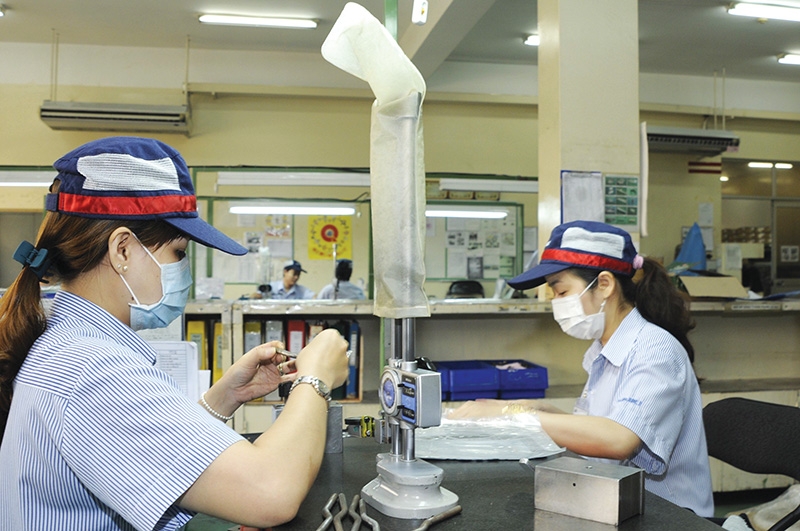Jackpot within reach for keen Japanese investors
 |
| More Japanese companies desperately need to find additional markets to expand in, photo Le Toan |
Speaking at the Vietnam M&A Forum 2020 last week, Masataka “Sam” Yoshida, head of the Cross-border Division of RECOF Corporation and CEO of RECOF Vietnam Co., Ltd. – said that investment via mergers and acquisitions (M&A) into Vietnam will be a trendy activity for Japanese companies which have the potential to last for years to come.
“The first trigger for such an opinion is the destiny for Japanese companies to find new markets to expand outside their own country,” Yoshida explained.
Most sectors in Japan are already well matured – for instance, almost one-third of the Japanese population is over 65 years old, making the Japanese average age almost 20 years older than the Vietnamese equivalent.
“The second trigger is using M&A as a growth strategy, which is backed up by the abundant accumulated cash during the last 20 years – reaching $2.34 trillion as bank deposits with almost zero interest rate,” he said. “Pushed by shareholders’ requirements to make use of money, it has started to flow into the M&A market which made its highest record in 2019 by over 4,000 deals in all types of M&A. This means there were more than 4,000 active and successful Japanese investors,” he said.
Indeed, Yoshida noted that there are a growing number of M&A transactions between Japanese investors and companies in most of countries in Southeast Asia. Among them, Vietnam recorded the highest number ever with 33 transactions last year.
In the past, due to the size of businesses, Vietnam was often outside the top three countries in this regard, but in 2019 it reached an amount of $389 million – 2.8 times higher than in 2017 and, for the first time, ranked just behind Indonesia in second.
During the first 10 months in 2020, there were 21 transactions publicly announced between Japan and Vietnam, ranking second in number after Singapore. Although there was an on-year 25-per-cent decline, given that the total of outbound Japanese deals dropped by 33 per cent during this period, the Vietnamese decline was both smaller than the average and also less than most other countries. In terms of transaction value, Vietnam was ranked second at a value of $282 million.
“We can say that the interest from Japanese investors towards Vietnam continues to be strong even in the pandemic situation, and the background of a slowdown of investment is purely a timing issue,” Yoshida insisted.
In fact, there has been a surge in Japanese-driven M&A deals across the world over the last five years. In 2019, all categories recorded a historical high. In 2020, the domestic M&A market was hit by COVID-19 with a 4-per-cent on-year dip up to October. However, the Japanese market already bottomed out in May, and now the monthly number has almost recovered to the previous year’s level.
Outbound M&A was particularly hard hit and has been slow in recovering, with on-year decline of around 33 per cent up to last month mainly due to worldwide border restrictions.
“From a Japanese point of view, their companies already have very little to do in a market like Thailand. There are already about 5,500 Japanese companies in the country and it is too late to enter. As for somewhere like Myanmar, there are fewer than 400 Japanese companies and so conservative investors still have to wait and see carefully regarding appropriate timing,” Yoshida said.
On the other hand, Vietnam, with more than 2,000 Japanese companies in the country, will continue to attract them. New Japanese Prime Minister Suga Yoshihide is following the policy of his predecessor and demonstrated his commitment to Vietnam by choosing the country as his first destination to visit while in the role. “This endorsement to Vietnam will create an enormous impact to the Japanese companies’ future strategies,” Yoshida explained.
“Once the hurdle of anti-pandemic restrictions on business activities are removed, a big wave of Japanese companies waiting to make progress on investment procedures will rise,” he said.
| Nguyen Thai Phien - Senior director of Corporate Finance, Novaland Group
We are accelerating to promote M&A. Novaland has just closed an agreement to purchase a 286-hectare project in the southern province of Dong Nai, worth roughly $1 billion. We are aiming to build this project into a tourism ecosystem, which will benefit our customers in a synchronised fashion. M&A is one of the fastest approaches to access new capital and increase our foothold in the market, especially when the land is “shrinking”. However, there are still major issues in a dealmaking process, particularly in the real estate sector. The first one is complex legal documents on real estate, and the implementation of the project. Secondly, the State Bank of Vietnam is tightening its loan activities for risk areas. For example in reducing the rate of short-term deposits used for medium- and long-term loans, which will seriously impede developers. On the other hand, the market’s reaction to news about M&A deals might be favourable or unfavourable depending on whether other participants think the acquirer took too much debt from the target company. Seck Yee Chung - Partner, Baker McKenzie
There are numerous examples of adaptation and growth potential. This includes factories that switch to producing personal protective equipment instead of garments. Also, there is growth in the export of electronic products and furniture, as bolstered by work-from-home and connectivity trends. Agriculture exports have also risen. Vietnam also sees continued investment in the renewable energy sector, as driven and enabled by the government’s policy and plans to develop this sector. Education remains attractive too, as this has always been a focus of Vietnamese parents. The digital economy is another bright spot. There is accelerated adoption of e-commerce and related online-enabled services such as financial and payment ones. This in turn has compelled the need to develop, and sparked investors’ interest in the logistics and warehousing sector to keep pace with e-commerce and the fulfilment of orders and delivery of products. It is also very encouraging to see Vietnam enter into and implement its international free trade agreements. Pham Duy Khuong - Managing partner, ASL LAW
One of the main factors that has obstructed Vietnamese M&A transactions is the legal framework. Currently, we have many sectors that only accept domestic investors and restrict the participation of foreign counterparts. The second barrier comes from unclear provisions of the Law on Competition. Terms such as “relevant market” are very general and not well defined, causing many deals between large investors to be halted. In the coming time, I think that M&A activities in tourism real estate shall be boosted because this area is facing financial difficulties. Other sectors such as retail, pharmacy, healthcare, online education, and fintech are all potential fields that need finance when growing. In addition, the energy sector is also interesting for many foreign investors, especially from Japan, Hong Kong, and China. Vietnam is one of the few nations in Southeast Asia to record positive economic growth in 2020, and the stringent disease control measures have led many to consider Vietnam a safe investment destination. Tran Ngoc Han - Senior associate, Russin & Vecchi Vietnam
In order to enhance the investment environment, the National Assembly passed the new Law on Enterprises which will also come into effect in January. It will complete the legal framework on corporate governance and help Vietnam reach international standards and common practices. It has also abolished several unnecessary administrative procedures and strengthened the protection of investors. This improves management efficiency and minimises costs, especially in corporate reorganisations. In addition, the government has issued a series of resolutions aimed at bolstering economic stability, improving the business environment, and enhancing national competitiveness. It is another signal confirming the government’s efforts to enhance investment here. The government has provided support to investors and businesses by reducing administrative burdens. Besides that, Vietnam has continued to benefit from general US and European trends of moving production out of China. This will yield Vietnam more opportunities to attract investors. |
What the stars mean:
★ Poor ★ ★ Promising ★★★ Good ★★★★ Very good ★★★★★ Exceptional
Related Contents
Latest News
More News
- New rules ease foreign access to Vietnam equities (February 05, 2026 | 17:29)
- Vietnam’s IFC creates bigger stage for M&As (February 01, 2026 | 08:16)
- Game startup Panthera raises $1.5 million in seed funding (January 29, 2026 | 15:13)
- Cool Japan Fund transfers shares of CLK Cold Storage (January 28, 2026 | 17:16)
- Nissha acquires majority stake in Vietnam medical device maker (January 26, 2026 | 15:40)
- BJC to spend $723 million acquiring MM Mega Market Vietnam (January 22, 2026 | 20:29)
- NamiTech raises $4 million in funding (January 20, 2026 | 16:33)
- Livzon subsidiary seeks control of Imexpharm (January 17, 2026 | 15:54)
- Consumer deals drive Vietnam’s M&A rebound in December (January 16, 2026 | 16:08)
- Southeast Asia tech funding rebounds on late-stage deals (January 08, 2026 | 10:35)





 Tag:
Tag:















 Mobile Version
Mobile Version